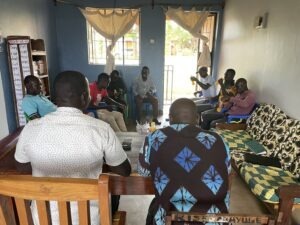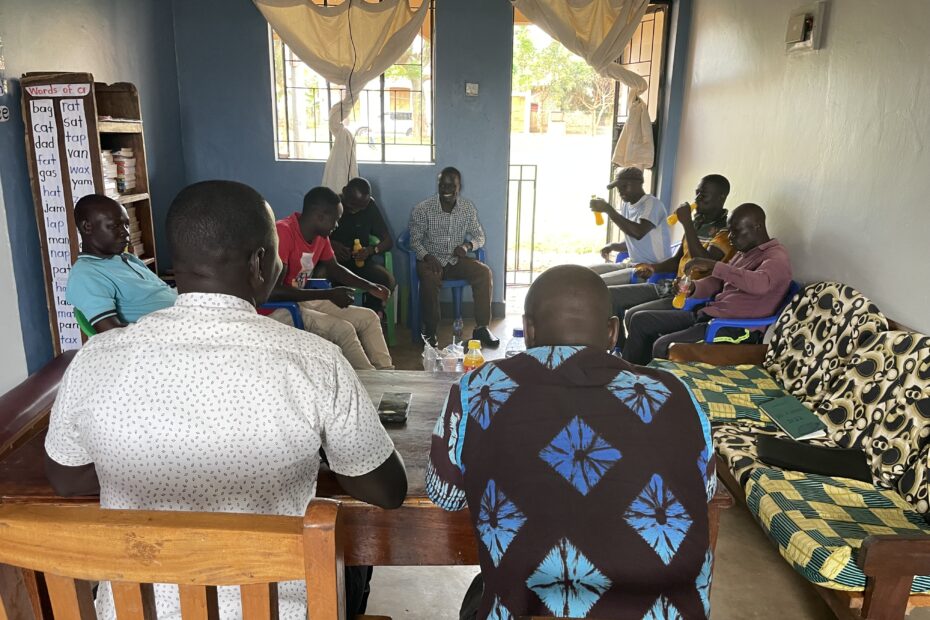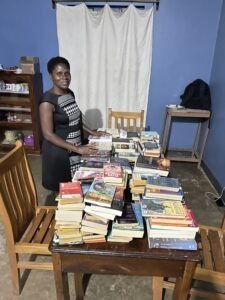Delving into new forms of reflective grassroots community organizing and building.
Introduction to Mayuge Community House:
Mayuge Community House is as the title suggests a house located in Budhebera village/ward, in Mayuge Town Council, in the rural district of Mayuge in Easter Uganda. The house built between 2006 and 2007, belongs to the Civil Connections founders Andrew Julius Bende and Stine Eilers, where the two lived for a couple of years before moving to Denmark in late 2009. During the couple’s stay in Uganda, their home was home to community development activists, community groups, RISE soccer, and netball league youngsters, as well as community organizing committees that flooded in for meetings, discussions, advice, or just conversations about development and community life.
The house became an automatic extension to the RISE Uganda (the NGO they worked with) office housed in the RISE Board Chairperson – Dr. Wilson Mwanja’s office lets about half a kilometer closer to the center of town. The RISE office and the house then became joint hosts to among many others:
- A meeting and co-working space for eleven (11) community groups from across the Mayuge district.
- A meeting space/office for the RISE Beneficiary Committee – which was a second policy board made of representatives from the community groups RISE worked with, to ensure contextualized community interventions and proper feed-ins for RISE programming.
- Meeting space and home to 12 soccer clubs participating in the RISE soccer league.
- A meeting space and home to 6 girls’ netball clubs participating in the RISE soccer league.
- Home to over 30 local and international volunteers that supported RISE work.
- The place where the first community-run computer center/internet access was set up.
- The home to Mayuge Fair Trade – a crafts and tailoring project set up as an income-generating initiative for the sustainability of RISE community groups and community work.
- A youth-friendly safe space, where young people could meet up and talk about life under the guidance of qualified adults, without being weighed down by rules and routines.
- A known space where everyone was welcome – and no one was rejected.
When Andrew and Stine left for Denmark in late 2009, the house was put up for rent so that it could fetch income for some of the community initiatives they and other community colleagues had started, and this worked well until the end of 2017 when the house remained vacant for a longer period. Already by 2017, Andrew and Stine started reminiscing the role the house had played as a space for the community, and as months and then years went on without it being occupied or put to any lucrative use, this thought of bringing it back to its former role grew stronger.
With the advent of Covid-19, and the strong effects this had on local communities – especially semi-urban ones. And especially so, in the communities that RISE Uganda had worked with in the past, a decision was reached to re-establish the house as a community space/hub – where such groups and the rejuvenated Mayuge sports league could find affordable space for their further growth. With this, the house has now been named – Mayuge Community House, a name that embodies its purpose and value in the community.

The house – the complete section, and the extension housing a small community meeting room – Jan 2023

The house garden – here Jesper Alstrøm enjoys a moment with the daily visitors. These kids spend their days playing football and other games here because it is the only wide grass space left in the neighborhood.
Mayuge Community House – a space for personal, social, pedagogical, and entrepreneurship growth.
In its new form, the house has several ambitions, including being a space for mobilizing the community and a space to gather. A platform/reference point for people-organizing, co-creation, and joint growth. A space for building cooperation among different community actors – strengthening existing networks and facilitating new and especially unusual networks and co-creation. Facilitating unity towards a common cause at a time to reduce fragmentation of ideas and efforts. A ground for being aware and facilitating cultural synthesis – as a way of contextual self-reflection and growth. Finally, the community house being a hub for various groups and walks of daily life presents a very interesting space for capturing community life and more so – the reflective and critical perceptions that the community forms itself, and that will be valuable in contributing knowledge and research on our concept of ‘Development from the Grassroots’.
Concrete projects running in 2023 and the key stakeholders already involved:
Already in January 2023, the house has the following concrete projects running:
- We have started a community library or call it a book hub/knowledge center. The idea is to have an easy-to-access knowledge place, that promotes literacy and supports correct information as well as academic achievement in an already marginalized community. The library already has over 2000 books and novels stocked, and the ambition is to equip it with several copies of the various Uganda National Curriculum for primary and secondary school by mid-2023.
- The house is now the main office and meeting place for the Mayuge RISE sports league. This means it is a host of up to 540 young people across 2023.
- The house is the home/meeting space/office for the Mayuge Beneficiary Committee – a 24-person group of community groups and sports club leaders that meet regularly to discuss different projects and the future of their groups. These are core to the functioning and ideas of the house.
- By mid-2023, the house will be home to a schools-library beneficiary committee, that will be charged with designing how the schools in surrounding areas could utilize and fairly access the library resources. We are targeting 14 schools within the vicinity to start with.
Below we zero in on the library and knowledge project to give you a deeper dive into what will happen.

Mayuge Sports League planning meeting (soccer clubs managers and captains) holding a meeting in the Community House – January 2023.
The Mayuge Community House is a core space for developing, facilitating, and encouraging learning, correct information, and pedagogical methodologies and tools development.
Learning and life education are relevant components for any community’s continuous development and for every age group. It is part of the Community House’s aspiration to contribute to the community and citizens’ motivation and desire to learn throughout life. Mainstream education subjects and knowledge, everyday information and news, culture, nature, community knowledge, and many others lie within the frame of education and life learning. Therefore, our ambition and resolve to create a space where such knowledge – books, novels, curricula, and all forms of literature and information sources can be found.
And this learning should not only be accepted in the limited form but contribute to comprehensive critical learning and further knowledge co-creation and development. The Community House shall take up the frameworks and terms of learning, knowledge development, co-creation, etc., in their widest meaning for example – instead of just education we will aim at making a framework for life education/learning because such wide scale/full circle learning is centrally important for developing and facilitating sustainable community growth. For an individual community citizen, education and life learning are important for their development throughout life, which if done properly contributes to robustness and life thriving/well-being.
There also needs to be established new or extended existing collaborations for the strengthening of children’s and the entire community’s possibilities for education and life learning throughout life. Collaboration with other local actors for example – schools and other learning centers, civil society organizations, government departments, etc. will give the CH the possibility to reach both young and community other segments in their ambition to foster life learning.
Specific areas of engagement include:
Establishing a community library that fosters reading and learning to read, stocks knowledge, and is accessible to all.
- Fostering reading. Reading as a component of education, life learning, and information access is a central part of the foundation for stimulating curiosity, desire for reading, and gaining access to written knowledge. The desire and the ability to read go hand in hand, and to be able to develop this combination, we need spaces/facilitative spaces and dedicated facilitators that continuously have their focus on facilitating and developing good reading skills/competencies and the desire to read. This is one of the central aspects that the library and the house shall facilitate in developing.
- Access to knowledge – both educational and informative. One of the key impediments to developing the desire to read and for the students to effectively compete with their better-equipped counterparts is the absence of what to read – literature, and written information. This is also one of the biggest factors in relation to the spread of hindering of false information and knowledge. The library will be stocked with both the national reading/study curriculum as well as other forms of literature to facilitate access to this.
Run community mobilization activities for learning within communities – call it a mobile library.
Setting up a stationed community house and library in so vast communities as rural Uganda and other parts of the world find themselves in is not enough. The Community House will act as an epicenter, from which we will facilitate the same activities and services here available to be extended to other communities through mobile modalities for example – day trips to different communities, mobile library van, mobile community teachers, as well as brokering partnerships with other actors in different communities (e.g., schools and other learning centers) to be hosts to some of the manageable activities. This could for example be mini libraries and computer spaces.
Life-long learning structured courses that are defined by community themes and other inspirations.
We envision that while the formal education system and other learning providers avail different possibilities for learning, there remain segments of the community that will benefit from a space that facilitates processes for developing context-specific – needs-based learning modules developed in collaboration with the different community segments.
Alongside these is the ambition of the community house to in a context-aware mode introduce what Paulo Freire called Problem-posing education in the form of philosophical and cultural analysis of the local community’s life and the building expanded awareness of what people’s choices and actions and foundations for such are, and what other possibilities are within their reach in the hunt for self-empowerment and development.
Providing literature in all forms accessible – especially in context-supportive forms.
In continuation with the development of the community library and initiatives to provide information, the ambition with this resolution is that we will focus on exploring and using new methods, platforms, and collaborations in delivering varied literature that answer to the needs of the community learners. These for example include but are not limited to – audiobooks, podcasts, documentaries, guided YouTube, online learning, collaborations with spaces like Coursera, etc., e-books, and connecting with mega spaces.
Supporting the grounding of the UN sustainability agenda.
The Community House’s ambition to build sustainable communities and development gains a lot of boost and guidance from the UN Sustainable Development Goals (SDGs), which we find to give an all-encompassing framework. Our work regarding the UN SDGs along with others revolves around strengthening the local community’s knowledge and possibilities to work with the SDGs, and actions that contribute to the changes that the SDGs strive to bring about.

Boxes of books waiting for shelves to come up on. A small TV has been provided for Audio-visual content – January 2023.

Susan – with her Teacher background has already started giving voluntary lessons to the kids playing in the compound whenever the chance arises.
Conclusion:
While 2022 was a planning and designing year, we see 2023 as the year we go into real action with the house and the communities that call it their safe space. The house is now active, and the final touches on expanding it for large-scale use have started – where we are boasting of a small community conference room to give us a chance for our communities to gather in large numbers. And the beneficiary committee and the house management team are also planning an official launch in June 2023. We are looking forward to many years of Development from the Grassroots action over the years. And it is not late to join in.
Sincerely,
Andrew Julius Bende


